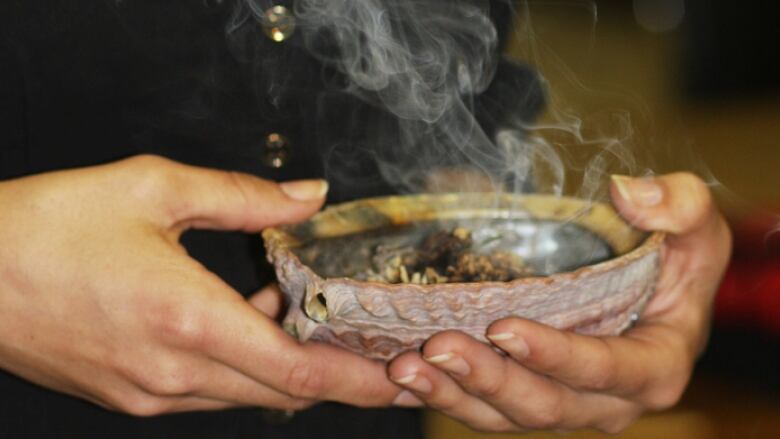B.C. mom loses court case arguing Indigenous ceremony at kids' school infringed on religious freedom
Parent felt traditional smudging ceremony was religious activity, not cultural

The B.C. Supreme Court has dismissed a mother's case against the Port Albernischool district that argued a smudging ceremony at her children's school and a prayer performedby a hoop dancer at a school assembly infringed on their religious freedom.
Candice Servatius, an evangelical Christian,claimed that both events, which occurred in 2015 and 2016 at John Howitt Elementary School, were religious and not cultural activities.
Justice Douglas Thompson wrote in Wednesday'sruling, in which theNuu-chah-nulth Tribal Council was an intervenor, that Servatius"failed to establish that the Nuu-chah-nulth smudging in her children's classrooms or the prayer said by the hoop dancer at the school assembly interfered with her or her children's ability to act in accordance with their religious beliefs."
In November of 2016, the Justice Centre for Constitutional Freedoms (JCCF) filed a petition on Servatius'behalf in Nanaimo after she received a letter the previous yearfrom the school's principal, saying that her kids would be participating in a traditional Indigenous smudging ceremony.
The letter saidthat students would participate by holding a cedar branch while smoke from sage was fanned over them to experience "cleansing energy."
When Servatius went to the public school to learn more, she found out that the ceremony had already taken place.
School District 70 said the ceremony was a chance forstudentsto learn more about the Nuu-chah-nulthtraditions.
The district also said in court documentsthat it is committed to ensuring its educational programs comply with the Charterand Section 76 of theSchool Act anddoes not agree there hadbeen any violation of rights.
Itdid concede however, it could have been clearer that participation was optional.
Servaitus wanted the district to declare the ceremonyinfringed on her children's religious rights and a promise that similar events would be prohibited. However, the court did not grant this.
Judith Sayers, president of the Nuu-chah-nulthtribal council, said it's not up to other people to defineNuu-chah-nulth practices as religious instead of cultural.
"We need to be able to define what is religion and what is culture," she toldOn The Islandhost GregorCraigie.
"We have our spirituality, which is just totally different than the organized religions that we see today ... the court saw that this was really an attempt to be teaching our culture to our children of all ages."
The court ruling states that about a third of students in the Vancouver Island district are Indigenous and the district's position to increase student awareness and understanding of Nuu-chah-nulth culture, historyand language is consistent with the provincial curriculum.
In his ruling, Thompson said the students, includingServatius's children, observed a smudging ceremony and hoop dance. However,the judge said, "they did not hold cedar branches andwere not smudged or otherwise cleansed."
"I conclude that proof on an objective basis of interference with the ability of the petitioner or her children to act in accordance with their religious beliefs requires more than the children being in the presence of an Elder demonstrating a custom with spiritual overtones or being in the presence of a dancer who said a brief prayer," said the judge in his ruling.
"For us, it's being able to show our children that they have the ability to practice their culture or see it being demonstrated as was the case here. So they feel a level of comfort and they can have greater success," said Sayers, who is "very happy" with the court's decision.
"We're trying to eliminate racism, bias, discrimination, and if we can't teach children about our differences and teach children about what we're about, then we're going to continue to have those issues."
Next steps
Servaitus' counsel is not satisfied with the decision.
"This is a disappointingdecisionfor citizens from any religion or cultural background, each of whom has a constitutional right to be free from state-compelled spirituality," stated Jay Cameron,Servatius's counsel.
"We are reviewing the decision with an eye to next steps."
With files from Meghan Thomas












_(720p).jpg)


 OFFICIAL HD MUSIC VIDEO.jpg)
.jpg)



























































































